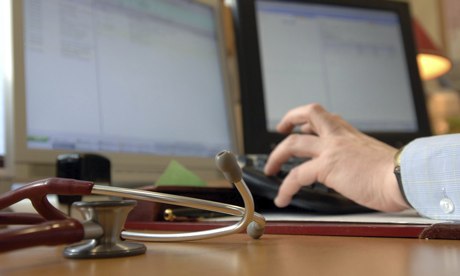
This month every household in England will receive a leaflet from the NHS. The leaflet – Better Information Means Better Care – explains the benefits of sharing your medical records and information about the outcome of NHS treatments you receive. The information will be anonymised and you can choose to opt out, but the more people's data is included the bigger the potential medical benefits to us all.
The use of people's GP and hospital medical records for health research is rightly a matter of debate. Media stories such as the Guardian's "NHS patient data to be made available for sale to drug and insurance firms" on Monday reinforce people's concerns and confusion about why their personal information is being extracted.
However, it is important that people do not opt out. To reach all our goals of successfully fighting disease and preventing illness we really need everyone to share their medical records and every GP to allow their practice to join the system. By doing this, people could potentially be saving someone's life or helping to find a new treatment for a rare disease.
The NHS is a unique health system that, unlike those of most other countries in the world, has a rich source of information about millions of patients with health data spanning many years. This enables research on the healthcare that people are receiving in the NHS and the performance of medicines and medical devices such as pacemakers.
For example, through the extraction of data from GP and hospital medical records, health researchers can study the benefits and side effects of treatments for older people. This will include vital information on the efficacy of those drugs in patients who have a range of other diseases, who may be taking other medications and who may not actually take every dose of every drug.
This real-world safety information is crucial to provide high quality healthcare and it will also shine a light on medicines used during pregnancy and in children, and on vaccine use.
That researchers in pharmaceutical companies are involved should be seen in a positive light. Pharmaceutical companies are the people who can deliver much needed new drugs.
Once a drug is on the market, its safety and effectiveness need to be monitored. The data also has a large part to play in getting new improved treatments into the NHS for both common and rare diseases. Data from health records can make an invaluable contribution to clinical trials. Powerful, efficient clinical trials mean there is the chance to enable the treatment to be available sooner.
The Clinical Practice Research Datalink is the research part of the wider endeavour to ensure that people's medical records are used to improve every part of the healthcare delivery system. It will work alongside care.data and the Health and Social Care Information Centre.
I welcome the NHS leaflet about "sharing information" that has been widely distributed. It is a genuine and honest attempt to inform people about why their medical records are so important for improving healthcare.
The vast majority of health research takes place using anonymised medical records that are only released to approved health researchers under very strict obligations covered by legal agreement. The confidentiality of health data used outside of clinical records is overseen by a range of independent committees with a good track record of handling sensitive data. In over 20 years working in this area I am unaware of any privacy issue arising from the use of medical records for research.
In addition to health research, anonymised medical records give the NHS a valuable insight into whether clinical care guidelines are appropriate and that the right treatment is used at the right time in the right patient.
Using people's medical records for health research requires very little time of GPs and other healthcare professionals. Medicine is like the ultimate jigsaw puzzle, with health researchers struggling to find the missing pieces. If people opt out of having their medical records shared, the picture may never be complete.
• Dr John Parkinson is director of the Clinical Practice Research Datalink, which works to maximise the use of anonymised NHS clinical records for medical research

